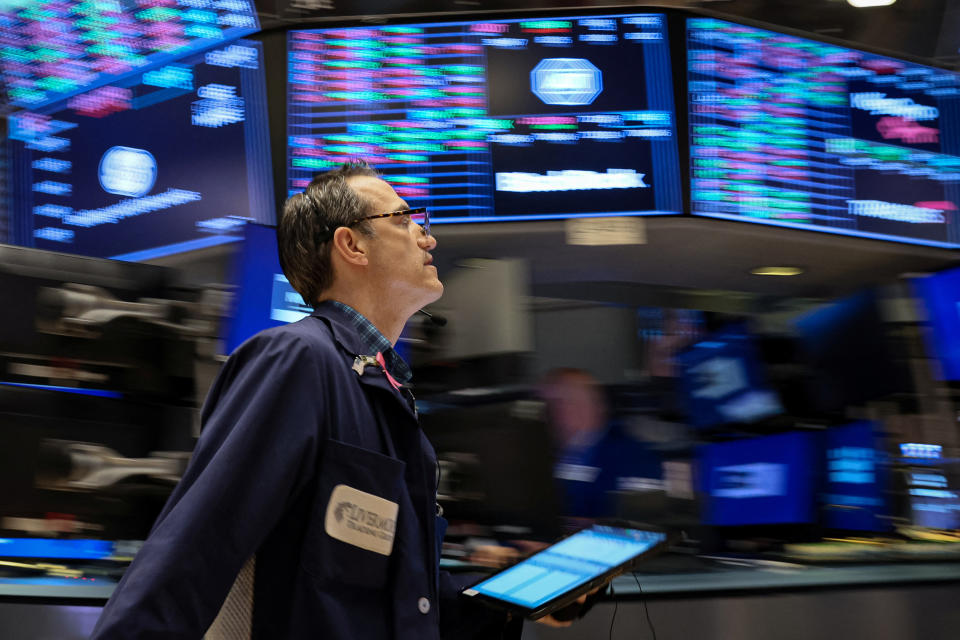U.S. stocks tumbled Friday as the Federal Reserve’s most closely watched inflation measure came in stronger than expected, in another sign that price pressures have become sticky into 2023.
The S&P 500 (^GSPC) sank 1.3%, while the Dow Jones Industrial Average (^DJI) plopped nearly 400 points, or 1.2%. The technology-heavy Nasdaq Composite (^IXIC) tanked 1.6%.
U.S. Treasury yields scrambled higher following the reading. The 2-year note surged 10 basis points to 4.8% while the 10-year note gained 7 basis points to 4.86%.
The Personal Consumption Expenditures (PCE) price index — the Fed’s preferred assessment of how quickly prices are rising across the economy — rose 0.6% in January and 5.4% from last year. On a “core” basis, which strips out volatile food and energy components, prices rose 0.6% for the month and 4.7% from last year.
The report from the Commerce Department also showed that consumer spending rose 1.8% last month from December after falling the previous month.
The numbers support recent indications inflation is not falling at the pace and extent investors have been hoping for, even as prices have stabilized from the peaks of the current inflation cycle.
“First December CPI was revised higher, and now each reading for January surprised to the upside. Inflation’s like an old boyfriend or girlfriend that keeps showing up when you don’t want to see them,” David Russell, Vice President of Market Intelligence at TradeStation said in a note.
In individual stock moves, Block (SQ) rose 3% after the payments processor reported fourth-quarter financial results that saw profit and revenue top expectations.
Warner Bros. Discovery (WBD) shares rose more than 2%, even as the media giant posted a big revenue loss for the final three months of the year.
Boeing (BA) shares were down 3.5% after the airline manufacturer said it paused deliveries of its 787 Dreamliner jets because of a documentation issue.
Beyond Meat’s (BYND) stock rallied nearly 15% after better-than-expected earnings and CEO Ethan Brown said the company is seeing progress in its efforts to cut costs and manufacturing hurdles.
Beleaguered used car retailer (CVNA) was in a downswing, plunging 12% after reporting a net loss that was nine times wider in the fourth quarter.
The bumpier-than-anticipated road to restoring price stability and strong economic data to start the year — nonfarm payrolls rose by 517,000 in January while retail sales surged 3% — have prompted investors to readjust expectations around the path forward for interest rates, putting a dent in the market’s recent momentum.
The S&P 500 snapped a four-day losing streak on Thursday as stocks closed higher. But earlier this week on Tuesday, stocks had their worst day of the year.
“Equity bulls and even Chair Powell have bragged about anchored expectations for inflation and how consumers and investors believe it is moving in the right direction,” Morgan Stanley Chief Investment Officer Lisa Shalett said in a note earlier this week, noting that January’s Consumer Price Index (CPI) and Producer Price Index (PPI) raised questions about whether inflation progress is stalling.
“Given data crosscurrents, the central bank needs to tread carefully. Investors still wagering on a ‘Fed put; or quick return to financial repression are apt to be wrong this time,” Shalett said. “Fed credibility is on the line, and it is likely to risk overshooting rather than quitting the inflation fight too early.”
—
Alexandra Semenova is a reporter for Yahoo Finance. Follow her on Twitter @alexandraandnyc
Click here for the latest trending stock tickers of the Yahoo Finance platform
Click here for the latest stock market news and in-depth analysis, including events that move stocks
Read the latest financial and business news from Yahoo Finance
Download the Yahoo Finance app for Apple or Android
Follow Yahoo Finance on Twitter, Facebook, Instagram, Flipboard, LinkedIn, and YouTube


